#hong kong education system
Text
can't believe I have public exams to go to on a public holiday of all times
literally everyone gets a break other than form 6 squad
anyways fuck chemistry (/lh i am sleepy and actually enjoy the subject i just hate assessments)
1 note
·
View note
Text
culture tips for writing asian settings: calligraphy (pt ii)
in my last post i talked about calligraphy more generally, but here i want to talk about the calligraphy from atla. all of the calligraphy from the show is written by dr siu-leung lee and i'll be using the artbook as my reference.
if you're a writer or artist approaching written chinese, you can think about how script and handwriting might tell us something about a character. dr lee certainly did, and he even tailored writing styles to who he thought might've been writing that text: "If it were a highly cultured royal attendant, he would use a refined, elegant style, but if it were a low-level clerk, he would use a more pedestrian handwriting style."
first thing: modern standard chinese coming out of mainland china uses simplified chinese. this system was developed in the mid-20th century, so it's pretty anachronistic to use this for atla. instead, you should be using traditional chinese as dr lee does (which is still used in hong kong, taiwan, and many diasporic communities). i usually use google translate to switch between the systems.
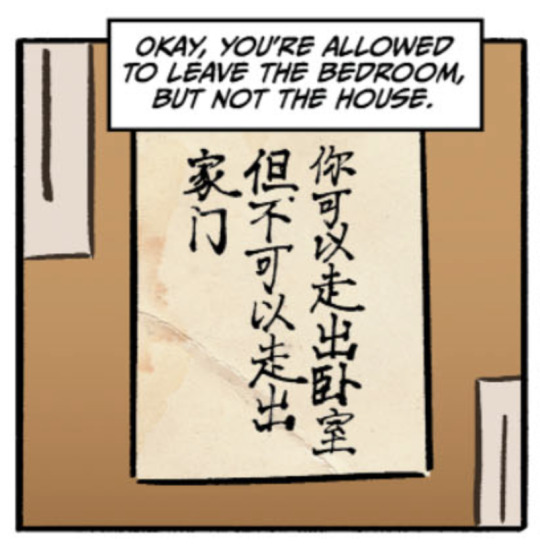
note the use of simplified 门 (door) instead of the traditional 門 from the aang's unfreezing day comic.
next i'm going to take aang's wanted poster as an example of three different chinese scripts we see in the show. the "title" is in clerical script, the body of the text is in regular script, and the seal is in seal script.

regular script is the standard way you'd learn how to write chinese nowadays. you can see (as i mentioned in part i) how the text is meant to be read up -> down, then right -> left.
clerical script is characterised by fairly compact shapes and a kind of "roundness", and was developed in the late warring states period. this is the script used for the chinese title of the show! in the context of atla, it implies to me that the writer has more specialised calligraphic training than the average person (who, if they can write, would be using regular script). you can compare the difference in styles for the same words between clerical (L) and regular (R):
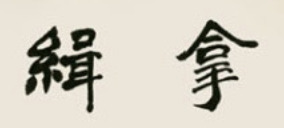

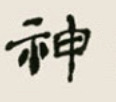

seal script is the most archaic form of chinese on display; this one wouldn't have been written by the calligrapher, but carved into a seal by a craftsperson and then stamped onto the page.
what's also really interesting is dr lee implies a difference in script between the nations. some of the characters used to write water tribe-related concepts:
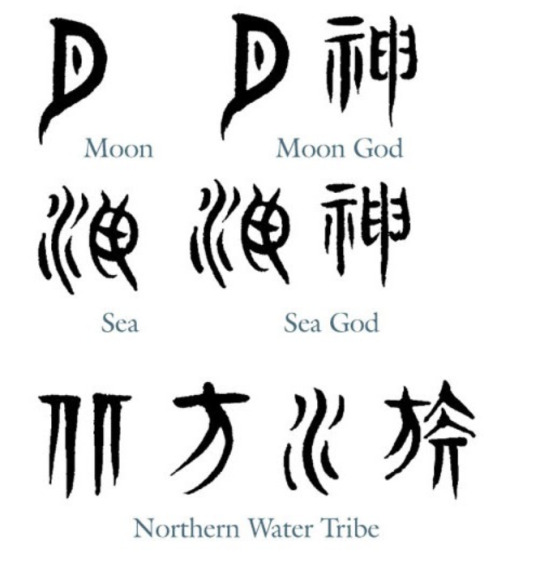
this is an adapted form of oracle bone script, the one of the earliest forms of chinese writing. this fascinated me because this script was—as the name suggests—written on bone, and perhaps reflects something about the material of what the water tribes were using to write. (you can input modern characters into this website to see examples of their older forms.)
finally, some cool differences in handwriting! this is from the fire day festival poster:
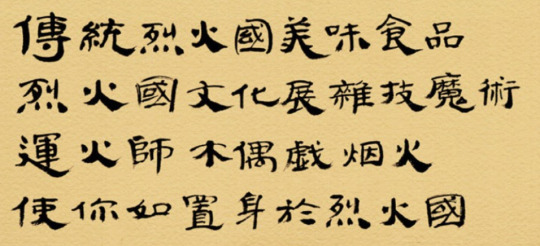
this uses regular script, but in contrast to the excerpt we saw before, the formation of the characters is more haphazard (excitable?). it's also written left -> right! this suggests to us the writer is a commoner, as opposed to a royal scribe.
these are some things you can keep in mind when you're writing or drawing in this universe—while you're probably writing in english, the characters would be steeped in the writing systems we've been talking about. if a character's sending a letter, what might the recipient notice about the handwriting? what does it tell them about their social status or education? could the shape of the letters signal something about where they come from, i.e. water tribe characters write a more curvy script?
disclaimer | more tips
583 notes
·
View notes
Note
hi! can you recommend some books by indian writers? both fiction and nonfiction. thank you
Hi! I read your other message and here you go (I've also linked other asks where there are more relevant books mentioned)
Fiction
[x] | [xx]
Serious Men by Manu Joseph — about a low-caste man in a chawl in Mumbai and all that he does for his son to escape the limits of his position; satire on caste and class, scientific education in the country
Raag Darbari by Shrilal Shukla (trans. Gillian Wright) — really, really good satire on an village in the north a few decades after Independence; looks at how systems fail on ground, how clearly incapable most of them are at dealing with problems; also about the early years of the nexus forming between criminals, politicians, and businessmen and corruption taking root
High Wind by Tilottoma Misra (trans. Udayon Misra) — about a Sanskrit scholar who in the 19th century moves to colonial Shillong; explores the changes happening in Assamese culture and society during the time, how different communities and 'tribes' take shape and negotiate the colonial order
A Burning by Megha Majumdar — how the lives of three people intersect at the crossroads of law, justice, class aspirations and in an increasingly volatile political atmosphere
Baluta by Daya Pawar (trans. Jerry Pinto) — a memoir by Pawar about being a Dalit and how the identity changes as it moves from the village to the city
Name Place Animal Thing by Daribha Lyndem — it's like a bunch of character portraits of people who are all connected to each other and together they paint a picture of one girl who's growing up in a turbulent community in Shillong
The Lives of Others by Neel Mukherjee — an old and joint family in Kolkata in the 1960s; looks at how it adapts or fails to; it's really good at how it shows a very distinct social class in decay in specifically post-Independence Kolkata but also at the same time could be about similar stories of the zamindar/landholding class unravelling elsewhere
A similar but older take on the joint family decaying in Maharashtra is Old Stone Mansion by Mahesh Elkunchwar. I read the original and I do vaguely remember there being a translation, but I'm not sure so do check that out. I think it'll be in this.
Battlefield by Vishram Bedekar (trans. Jerry Pinto) — about a Hindu man and a Jewish refugee who meet on a ship going from Europe to Hong Kong just before World War II; looks at what it means to be in exile, what it means to aspire to nationhood
I would also recommend the Aleph Book Company series on Greatest Stories Ever Told. I've only read a few but they seem quite well curated.
Non-fiction
about northeast India | the revolutionary movement | military history | [x] | colonisation and aftereffects |
A People’s Constitution by Rohit De — how people experience the constitution; how they participate in the legal and political process; really great because it takes the constitution beyond its documentary role
India Trilogy by V. S. Naipaul — An Area of Darkness, India: A Wounded Civilization, and India: A Million Mutinies Now; one of the best commentaries on 20th century but post-Independence India; also very different from other commentaries because Naipaul worked to see the country as something other than a former colony; also great because you get to see him traveling and changing his mind and arguing with himself over the three books
Sixteen Stormy Days by Tripurdaman Singh — about the first amendment of the Indian Constitution which has been a controversial one given that very soon after the Constitution being ratified, it put curbs on freedom of expression and property rights and gave birth to the Ninth Schedule
India: A Sacred Geography by Diana L. Eck — how precolonial and ancient Indians imagined the geography through religion and vice versa; how Hinduism and generally Indic religions are closely tied with the land
India Unbound by Gurcharan Das — it's a personal economic history of sorts where he looks at the post-Independence economic growth (or lack thereof) through the routes his life has taken; really good because he brings to a table the experience of living in a 'mixed' economy and can really get across why 1991 was such a big deal
Castes of Mind by Nicholas Dirks — essays on how caste and race interacted to reorder the social structure in colonial India; how law, policy, politics, and profit all worked together when it came to matters of social categories and identity
The Eastern Gate by Sudeep Chakravarti — sort of journalistic history on how 'mainland' India has seen the Northeast, how insurgency took root; how conflicts have been navigated, solved, worsened
Modern South India by Rajmohan Gandhi — South India from the 17th century to the 20th; a little information heavy at times but useful
Our Moon Has Blood Clots by Rahul Pandita — memoir on the Kashmiri Pandit genocide; also see his Hello Bastar if you're interested in the Naxalites
Kanshiram by Badri Narayan — a biography of Kanshiram and through him looks at Dalit politics and the whole world of OBC and Dalit consolidation
The Emergency by Coomi Kapoor — like India Unbound, a personal account of sorts of living through the Emergency; and she was a journalist then so it's really in-depth
Army and the Nation by Stephen Wilkinson — the relationship between the Indian Army and the Republic; how India has managed to keep the military establishment away from politics unlike Pakistan, which to all intents and purposes, inherited the similar institutional setup as India
Happy reading!
459 notes
·
View notes
Note
If Jade had gotten to quit and raise Lian and never raninto Roy again, where do you think she would have settled down?
this is such a great question, omg! more than likely, she would have stayed in hong kong. her base of operations is usually listed as "mobile" but she is consistently shown to be living there. the weather is generally beautiful, and they have a good education system. hell, lian was born there! it's also the place that would feel most like home given how much time she spent there.
#🎤#jade nguyen#lian harper#any other place i can think of is possibly london#america is probably a visit-only kind of location lol#i actually have so many thoughts on what life would've been like if jade never found out/saw roy again#everything would be completely different omg
8 notes
·
View notes
Text
Ok hold on tight fellas, a few months ago I was basking in the glory of the Tom and Jerry meet Sherlock Holmes movie having surprisingly gorgeous animation and a Holmes and Watson with genuine chemistry.
I've got a new favourite "Why in the world does this try as hard as it does" animated Sherlock Holmes adaptation.
Sherlock Holmes and the Great Escape (or sometimes i've seen it translated as the Great Jail-break?), animated in Hong Kong, released in 2019.
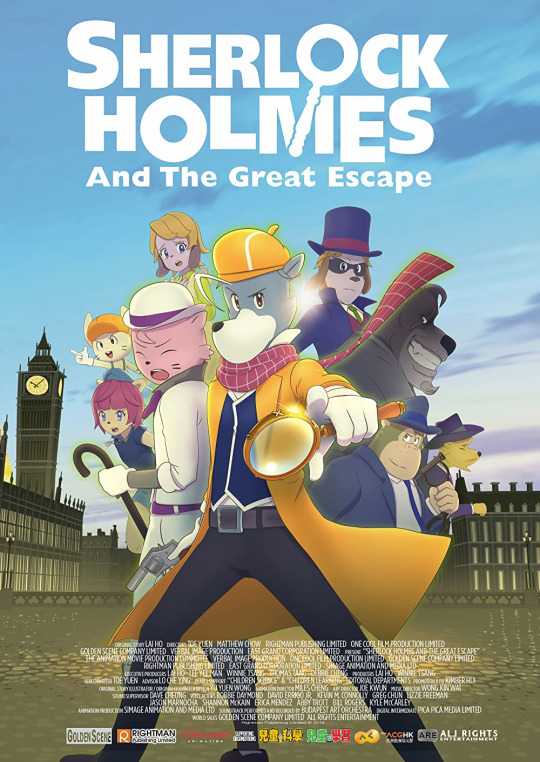
What you need to know about this movie:
For some reason, Sherlock Holmes is cosplaying as Yellow Edward Elric from Fullmetal Alchemist throughout. In fact, there are a number of shots that I think are direct references to Fullmetal Alchemist. I have no idea why this decision was made.

Watson is a rather effeminate pink cat who sports this delightful bow tie/bowler hat/cropped trousers ensemble. He is somehow still definitely John Watson, transmogrified into a femme anime cat person.
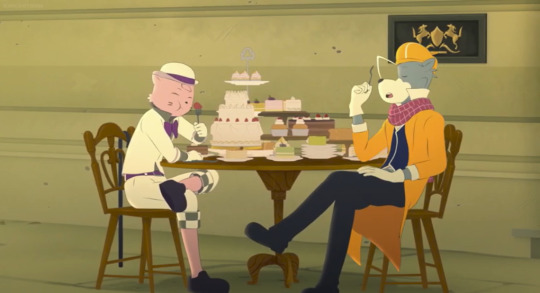
Despite being a world full of multicoloured anthropomorphic characters, characters can be murdered in this movie? There are actual guns that look like guns? Systemic causes of poverty are considered? The law is not always just? Prisons do not work? I mean I'm not saying any of these issues are addressed in an especially sophisticated way, but I wasn't expecting them to be addressed at all!
Actual Moments of Pathos?!!! !!!!!!!
These characters aren't actually called Mrs Hudson and Wiggins, but they are definitely Mrs Hudson and Wiggins.

There is an Arsene Lupin-esque gentleman thief character who I genuinely like.
As part of the mysteries there are animated illustrations of basic physics, like what happens to molecules when water is frozen or air pressure changes. Science education ++
Pink Femme Catson gets a Reichenbach moment where he gets to scream his Sherlock's first name dramatically. Of course.
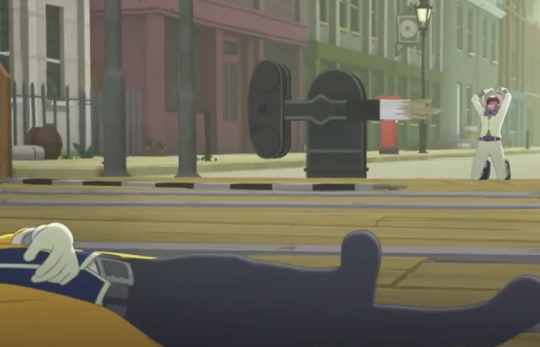
This happens:

"It seemed to me that in that moment, my dear friend anthropomorphic anime Edward Elric ripoff Sherlock Holmes was more nearly moved by the softer emotions than I had ever seen him."
.....
So yeah that was an unexpectedly wild ride.
EDIT
Also Pink Kitty Watson sets the bar punishingly high for Watsons not taking much nonsense from their Holmses
114 notes
·
View notes
Text
Avery Sirin
Alliance Mechanic

See also: Dela Raisaris
The following information is classified. Spectre status required.
PERSONAL HISTORY
Avery Sirin was born in 2154 on the fledgling human colony of Terra Nova to Leilani and Grigol Sirin. The colony expanded slowly at first, and as a child Avery's education was patchy and largely delivered by her parents or neighbours, and focused mostly on important aspects of colony life. From an early age, she developed a keen interest in machinery and technology.
The draw of frontier life eventually attracted an impressive number of first-class educators, and Sirin was one of the first enrolled in Terra Nova's school system in the capital of Scott. Keen to encourage the colony (and boost their own recruitment numbers after the Relay-314 incident) the Alliance provided Avery and many of her peers with full scholarships to the newly established Falconer University in Scott City.
Avery attended the Technical Engineering college in 2172, just as Terra Nova's famous platinum rush was beginning. The sudden influx of people and credits transformed the colony over Avery's four years of study. As many of the new arrivals were non-human, this was Avery's first experience of wider galactic culture. While already committed to two years of Alliance service thanks to the scholarship program, in her third and fourth years of study Avery joined several social clubs designed to build inter-species relationships.
Her parents, however, were distrustful of the new arrivals and resented the industrialisation of their colony. They became reclusive and moved away from the city, causing a rift between them and their daughter that has resulted in a noticeably frosty relationship.
After her graduation in 2176, Sirin was assigned as a flight mechanic on the SSV Hong Kong, where she developed a romantic relationship with a pilot that lasted most of her required two years of service. It ended poorly with the realisation that her partner looked down on her as 'just an engineer'. After breaking it off with him, she applied - and was quickly accepted - to the Alliance Flight School in 2178. After the one year intensive program, she graduated in the top three of her class.
She was reassigned to the SSV Shenyang in 2179 and flew on several pirate suppression missions in the Attican Traverse, protecting Alliance colonies from slavers. Her skill and dedication were recognised with a promotion to 1st Flight Lieutenant in 2181.
In 2183, the Shenyang fought in the Battle of the Citadel against the rogue Spectre Saren and his geth army. Sirin fought with distinction, destroying several geth fighters and helping co-ordinate the defence of a hobbled turian cruiser. On the recommendation of Major Helmud Diaz, Sirin was awarded a commendation and, with the appointment of the new human Councillor in early 2184, was approved for transfer to the turian heirarchy ship Severum of the Council Demilitarization Enforcement Mission in the krogan DMZ.
EQUIPMENT

Alliance Interceptor Fighter
Designed for ship-to-ship combat and missile screening duties, the Alliance SX3 is less hardy than its turian equivalent but significantly more agile.

M-3 Predator sidearm
All flight personnel are assigned a basic sidearm in case of emergency. Avery's pistol range scores are comparatively poor.
SKILLS
While not much of a combatant outside of her cockpit, Avery can use her Alliance-issue omni-tool as a defensive and offensive weapon. She can release an electrical overload to disrupt enemy kinetic barriers, or repurpose the charge as a shield boost for herself. Additionally, she can use the on-board minifacturer to produce a swarm of nanides, which can be used by an invasion program to strip enemy armour, or a restoration program to repair equipment.
PSYCHOLOGICAL EVALUATION
Avery Sirin is a model Alliance soldier. Dedicated to her mission and loyal to her allies, she has a quiet resilience and determination that make her an asset to any operation. Off duty, she is curious and friendly, and makes a noticeable effort to get along with and understand her non-human comrades. Despite her efforts, she can come across emotionally distant and prefers not to talk about herself, which leads some - particularly turians - to think of her as aloof.
- REPORT FILED BY VERAPIA BESCUS, ST&R, 2184 -
#mass effect#original character#fanfic#character profile#writing#oc#human oc#Avery Sirin#mass effect lore
18 notes
·
View notes
Video
youtube
COVID rapidly spreads in China as government eases strict quarantine rules, December 27, 2022
China is grappling with the rapid spread of COVID-19 after the government began rolling back its zero-COVID restrictions earlier this month. Now, cases are spiraling across towns and cities, hospitals are overburdened, medical staff are outnumbered and crematoriums are running out of space. Judy Woodruff reports.
PBS NewsHour
There is no nuance left in politics or public health policy when there is either an absolute and strict inflexibility of zero COVID or wholesale dismantling of safeguards before the healthcare or support systems are prepared for the waves that have been forcibly suppressed. The political insistence on using their own less effective, non-mRNA vaccines based on the original strains rather than Delta or Omicron, coupled with a low vaccination rate of the vulnerable and elderly is not helping easing the transition at all.
The way they’ve been counting mortality from COVID diverged from nearly every other country since early 2020. A death had to be directly attributable to SARS-CoV-2 eliminating cases of many preexisting or undiagnosed conditions, chronic illnesses, and other high risk factors that may have been exacerbated by the virus which became listed as the direct cause or if they simply tested negative in the few days before dying. The policy as of this week will further limit the count only to deaths caused by pneumonia or respiratory failure after contracting COVID, in addition to dropping much of the remaining inbound quarantines and regular case counts becoming even more inconsistent with lived reality.
It appears the PRC was prepared to stay in suspended animation within an onionskin of self-isolation layers indefinitely, maintaining the appearance of control and adherence to policy that was left to different local officials to execute. Downgrading the classification removes the local, emergency-style powers to lockdown and quarantine which were used capriciously. Residential buildings, offices and commercial areas such as malls, and even theme parks could be suddenly cordoned without warning, causing panic due to the stringency of testing and knock-on effects if a positive case was found rather than fear of having contacted or contracted the virus. Becoming listed as a close contact or a complete stranger’s positive result could mean further quarantining and repeated testing, as well any change in one’s COVID passport status severely restricting mobility for work or education, travel, or even basic necessities. The protests spread because “dynamic zero” was anything but dynamic, refusing to change or amend course in preparation for a transition to an endemic or post-epidemic state. People were simply fed up and the building momentum was becoming a potential danger to a regime that had just renewed its own political mandates.
These things aren’t happening in isolation, China is also changing tact on its travel restrictions domestically and internationally. The Special Administrative Regions of Hong Kong and Macau have been trying to reopen ports and travel with the Mainland for years now for travel and economic reasons. Both were forced into accepting one-way policies where it was difficult for their citizens to enter China or even between one another, while rules were softened for travelers and politicians entering from and returning to the Mainland for short trips with the reason that the pandemic was less well-contained than within the Mainland.
As news of the highly visible current outbreak within China is continuing to emerge, the Hong Kong SAR is now proudly announcing agreements have been made with the Mainland to drop their travel restrictions posthaste. It’s being reported that many are travelling specifically for mRNA vaccines which are approved in Macau and Hong Kong.
#China#covid 19#coronavirus#pandemic#public health#politics#Chinese Communist Party#Xi Jinping#pbs newshour#seriously#fundamentally ridiculous#bureaucracy#zero covid policy#vaccination#epidemiology#reuters#financial times#news#current events#health care
43 notes
·
View notes
Note
Out of curiosity, do you headcanon Hong Kong as England’s ward or child??
I think that (during the Victorian era especially) Arthur sees his r/ship with Leon (HK) as akin to a wealthy benefactor/patron funding a promising young man’s education, rather than the familial father-son dynamic I see with Arthur and Alfred. He probably sent Leon to read for a degree at Oxford. So Leon would be closer to a ward, in that sense? Yao would of course have a very different view on this all (to put it mildly). From Leon’s POV, I think he’d read it similarly—he wouldn’t see Arthur as a father, but more as a powerful man who’s taken charge of his education and future that he needs to acquiesce to. And he would probably be more ambivalent about the ironies and contradictions of Arthur’s imperial worldview.
To me this embodies the cultural dimension of the British empire: the way I see it, Leon being ‘educated’ in the British system in the 19th century is also about Arthur wanting to instil certain concepts, ideas and world views too. He does this to other degrees with Alfred, Matt, Jack/AUS and Zee/NZ, but in different ways (tho Zee is the other one who my friends and I see getting a university education, and at Oxford too). With Leon, the aspect of history that I’m trying to translate into the characters is the historical dynamic of how HK existed within the British empire—intended as an important port city that further facilitated trade and commercial links across the British empire’s other colonies, where it was pretty important to have a class of educated local administrators for practical reasons. As well as noting the lasting cultural influence and legacy British rule had on HK, tho of course, Leon is y’know very much his own person and forms his own insights.
75 notes
·
View notes
Text
I’ve had some conversations recently in which the point arose that, considering how Reagan et al responded to the AIDS crisis, seeing the mismanagement of covid as at least partially intentional is not all that much of a conspiracy theory. I think we need to read this as an effort by capital to sabotage ground-level organising.
Covid has placed enormous pressure on working classes, as well as other marginalised groups, at a time when the class interests of those in power were threatened more directly than they have been for decades. Not only has the overwhelming narrative been the imperative to ‘get back to normal’, but this has been during - and indeed in direct response to - some of the largest popular movements for changing entrenched systems in living memory, especially in specific regions.
Of course union action continues to make strides in spite of labour movements being largely calcified in the West toward the end of the last century, but I’ve read that BLM was the largest protest movement in American history, and this was at the same time as mass scale protests in India, Hong Kong, Mexico, which were not focused on race. This could have been (and indeed can still be) catylised into a popular internationalist movement for proletarian gains, but has been largely buried in favour of record profits for corporations, and obfuscated by merely symbolic victories such as the trial of Derek Chauvin, and the ongoing jangling of keys that is Donald Trump.
I’ve heard many say that BLM lacked a clear goal and that’s why it started to fizzle; well yeah so did the French Revolution, but it still stands as one of the greatest precedents in history of the power of regular people to exact vengeance against their enemies. In fact, the measures taken to mitigate covid, such as remote working, served to demonstrate our proficiency in self-organising, which by extension also attests that managers have no real function but to threaten and steal labour. And such organisation can be multi-pronged: we can at once dedicate ourselves to productive labour, ideological gains, and leisure, and ultimately these efforts will compliment and enrich one another. We may even call this praxis.
Sometimes, perhaps more often than not, the ends which protest seeks is to prove that victory is within our grasp. Casting the statue of Edward Colston into the sea may have done little to improve the material conditions of Bristol’s people of colour, but it undoubtedly improved people’s mental wellbeing, and empirically highlights that we have the means to effect the change we seek without appealing to bourgeois authority.
A better world is possible. But sometimes ‘better’ must be read as the comparative it really is. A world in which the Tories aren’t able to deport masses to Rwanda is undeniably better, even if we still don’t have a nationalised solar power grid and so on. And there will always be greater improvements to work toward, more practical gains to win. We ourselves must ply the bellows.
All of this is simply to remind us: agitate, because we need all your enthusiasm; educate, because we need all your intelligence; organise, because we need all your strength! Together, we can break their haughty power.
#class struggle#class war#class consciousness#workers movement#workers' movement#original#labour movement#proletarian solidarity#international proletarian solidarity
80 notes
·
View notes
Photo

Indirect evidence for existence of dark matter surrounding black holes Dark matter does not emit or reflect light, nor does it interact with electromagnetic forces, making it exceptionally difficult to detect. Nevertheless, a research team from The Education University of Hong Kong (EdUHK) has proven that there is a substantial amount of dark matter surrounding black holes. The study results are published in the journal The Astrophysical Journal Letters. The team selected two nearby black holes (A0620-00 and XTE J1118+480) as research subjects, with both considered as binary systems. That is, each of the black holes has a companion star orbiting it. Based on the orbits of the companion stars, observations indicate that their rates of orbital decay are approximately one millisecond (1ms) per year, which is about 50 times greater than the theoretical estimation of about 0.02ms annually. To examine whether dark matter exists around black holes, the EdUHK team applied the "dark matter dynamical friction model"—a theory widely held in academia—to the two chosen binary systems, through computer simulations. The team found that the fast orbital decay of the companion stars precisely matches the data observed. Notably, this is indirect evidence that dark matter around black holes can generate significant dynamical friction, slowing down the orbital speed of the companion stars. The findings, which verified a theoretical hypothesis formulated in the late 20th century, represent a breakthrough in dark matter research. According to the hypothesis, dark matter close enough to black holes would be swallowed, leaving the remnants to be redistributed. The process ends up forming a "density spike" around the black holes. Dr. Chan Man-ho, Associate Professor in the Department of Science and Environmental Studies and Principal Investigator, explained that such a high density of dark matter would create dynamical friction to the companion star, in a way similar to drag force. "This is the first-ever study to apply the 'dynamical friction model' in an effort to validate and prove the existence of dark matter surrounding black holes," he said. "The study provides an important new direction for future dark matter research." Dr. Chan further mentioned that previous studies, which relied mostly on gamma rays and gravitational wave detection to examine the presence of dark matter, depended on the occurrence of rare events, such as a merger of two black holes. According to him, that might require a prolonged waiting time for astronomers. The novel approach adopted by EdUHK team, however, will no longer be confined by these limitations. He added, "In the Milky Way Galaxy alone, there are at least 18 binary systems akin to our research subjects, which can provide rich information to help unravel the mystery of dark matter."
15 notes
·
View notes
Text
Okay, I’m posting this here because it keeps getting taken down on insta and I’m done. This is supposed to be a fandom page where I post things I love and don’t stress about other things but I have to say this somewhere.
We have to stop wasting our social and emotional energy on trying to get companies to stop greenhouse emissions. It isn’t going to do enough, I want to be hopeful but we have to be realistic. We can still keep those kinds of things in mind, ride public transportation, e-bikes, compost etc… Our focus needs to shift to coping with climate change now. We have to start putting in place measures that will give us a safety net as things get worse.
We have to start thinking about coastal cities now, how to get people out when it starts to flood. NYC, DC, Sydney, Hong Kong, Tokyo, Cape Town, Rio de Jenaro, Mumbai, Venice, all of them will become unlivable and climate refugees need to go somewhere.
Places that will be safe need to prepare for large swaths of refugees, that means lots of housing complexes, and less single family homes. Strong communities will be essential, pick a place and stay there as long as you can. The goal has be to build up individual communities as much as you can, that is where you can do the most good. Do what you can to reduce poverty and homelessness. Tear down hostile architecture, make sure people know they are loved and wanted.
We need to localize as the global systems collapse, that means large local farms, people getting back into trades, small maintainable power grids, and making our cities walkable and transitioning to electric bikes instead of cars. We may be able to power large cities with nuclear, but we have to work on making it safer, preferably with thorium than uranium.
We need to find ways to create medicines without large mechanical systems, as well as creating disability aids. We can not rely on massed produced items. We need to start learning practical skills and get back into traditional trades.
We have to go back to paper instead of digital. All of the digital archives will be lost when we can no longer support global internet. All records of births, deaths, family trees, literature, cultural histories, all of it needs to be protected so it isn’t destroyed.
Indigenous people come first and foremost as they will be our guiding lights. They shouldn’t have to be, but they have the knowledge of survival and reciprocity on the local lands.
We have to get rid of the damns and restore those areas. They cause far too many floods as they deteriorate and the space that will gained makes for more livable land. Areas like Las Vegas can’t exist anymore; it takes too much water to keep them running and it isn’t sustainable in the long run.
We have to change our food system, meat animals currently take up too much space and resources as well as monoculture. Animals need to be raised locally, at the bear minimum, while keeping cultural foods around is important, nutrition has to come first. We need a three sisters type of approach to local farming, cultivating things that grow intertwined and benefit from each other and we need to do it regionally.
Food waste en mass is unacceptable - not finishing a meal because you are full is fine - supermarkets will eventually become obsolete but in the mean time we have to use things until the very end, until it it fully expired. No tossing out day old bread, fresh produce, anything that can be eaten.
I know this isn’t everything, policing, government, water treatment, the way we build, money, education, protecting cultural practices and artifacts, population centers, there are so many things I could go into but I’m not going to write a full essay on tumblr. The point of this is even though we can’t stop global warming, we have so much else to do. I am still alive today because this is my mission. I have lived my life with respect and compassion in everything I do, my goal of reducing suffering is how I make my personal and political decisions. I am doing all can to make the world a little better every day, and taking care of myself.
We either transition slowly now, or all at once later, and the latter involves a lot of suffering and death. In the meantime, speak out against genocide, turn your anger into action, find joy, and know your power.
(It’s really hard for me to cite my sources on this one because how do I cite my whole last semester of university, I’ll ask my prof and see if she has any ideas)
#climate change#climate action#climate crisis#politics#usa#just stop oil#good news#for you#global#economy#g20#joe biden#democracy#climate emergency#land back#stay educated#culture#leftism#democratic socialism#vote blue#education#educate yourself
2 notes
·
View notes
Note
嘉明 is pronounced (and can be transliterated as) “Gaming” in Cantonese. But as someone from Hong Kong and has Cantonese-speaking family in South-East Asia, I have never, ever seen it transliterated in that way. The method of transliterating the given name into just one word is very distinctly Mainland Chinese (we would transliterate it as “Ka Ming” or something along those lines”). So if his name is indeed Cantonese, this way of transliterating it is, at best, confusing, and at worst incredibly offensive and presumptuous of them.
aha! thank you for the education nonnie 🙏🏻 i too wish they put a space or a dash between the words ;;
hskjdskdj i mean. idk what is hoyoverse's internal process in localizing from cn to en or the localization team's system in doing so, but with the whole naming translation fiasco they had so far i'm thinking the team might just be missing SOP of doing proper research in the cultural significance behind that name itself, or the main writers team never bothered to put a memo for them, or something along the line. i don't think they meant for it to be offensive, they probably just need a better process. as a massive global team, there's bound to be a lot of gaps and info that gets lost as it goes through the multiple departments and teams around the globe.
#rin answers#rin is having tea with: anon 💟#why do i kinda sound like a corporate slave helphskshdks#am i speaking from experience from the last part? big yes hahah
4 notes
·
View notes
Text
Tears Of Themis Headcanons - Chinese Culture
Never forget, western audiences ... the boys are irrevocably Chinese!
Luke Pearce, 夏彦 (Xià Yàn)

His go-to foods include burgers and fries, but Chinese burger chains offer different fares than classic Americana. McDonald’s has a double-sausage in-between two burger buns, KFC has multiple curry rice dishes, pizza chains offer corn, country ham, and peas as toppings, etc. Breakfast menu items are congee and fried doughs, not egg and bacon croissants. You can get boba tea, sweet red bean soup, and taro pies. His favorites are the meat-heavy, double patty, triple sausage items.
It’s becoming trendier in China to join fancy gyms and work out for the sake of working out, wearing luxury brand compression suits and sport watches. Luke, on the other hand, is a government secret agent, so other muscleheads look down on him for using equipment that’s not top-of-the-line, god forbid his ratty old shorts and shirt.
Alcohol allergies are common amongst Asian people. Luke is the only one out of the three ethnically Chinese boys to NOT have an intolerance to booze. He loves a good beer on tap, which can be hard to find in a city that likely prioritizes bottles. It’s not like the American Midwest where 1-3 bars have proper kegs.
China’s gun laws are pretty strict. The vast majority of civilians will never touch a gun. Even those authorized the use of firearms, like Luke, cannot keep their guns and are only allowed use during specific scenarios.
Like many city folk in China, he appreciates the finer details of a good coffee. And like many of them, he doesn’t drink it regularly every morning like Westerners do. It’s more analogous to an ‘afternoon tea’ occasion, or to pair with dessert.
China’s government isn’t some villainous underground dictatorship like Westerners have been brainwashed into thinking. It’s actually pretty one-to-one with America’s police state. Luke being a secret government agent would be like if he was part of the FBI, or CIA. With all the iffiness it implies.
Artem Wing, 左然 (Zuǒ Rán)

Much of China can speak multiple dialects, like Cantonese, Mandarin, varieties of Hokkien. Artem’s main dialect is Mandarin, but he grew up also knowing Cantonese and Min Chinese, which is what his mother grew up speaking. This is on top of him knowing German (and presumably English, going by his education)
So from his mother’s side, he’s ethnically Hoklo - a sub-ethnicity of the Han. Those living in the metropolises sometimes don’t speak the older Hokkiens, but instead the more urbanized Min.
If Stellis isn’t based off of Macau or Hong Kong (and I seriously doubt it is), then Artem is working under the typical Judicial System Of China; it’s pretty similar to America’s, there’s the three branches of law and cases go through different courts of type and severity. Biggest difference is that there’s no jury, but instead the people’s assessors which act as additional judges on a panel.
His favorite sci-fi classics are The War Of The Worlds and Ringworld. The more fantastic and science-based, the better. Sci-fi lites like Logan’s Run or 1984 isn’t as eye-catching. He’s even read trashy ones like the Halo novels. When he reads, he always does so in its original English. He buys both Mandarin and English translations of his favorite books.
I feel like Artem represents the Asian ‘born to work’ mentality that a lot of people grew up with. You study hard ‘cause you have to, find a good job ‘cause you have to, and after that .... who are you really? You have to essentially find yourself and what you actually enjoy in life. Many Asian people start doubting this life around Artem’s age.
Everyone knows Artem can cook. But he’s not defaulting to chicken noodle soup or lasagna like many players write him doing, he’s making savory pea jelly, fried rice noodles, and wrapping his own xiao long baos with super thin homemade wraps that never pop in the broth. Of course he knows how to make beef stroganoff or whatever, but it’s not his specialty.
The people of China are more willing to get into other people’s business if they see something they think is not right. Not like America or the UK, where strangers will largely just duck their heads and walk right past. So Artem has, more than once, stepped into some escalating argument on the street to speak his piece as a Proper Lawyer. Once, it was when a mom was threatening to beat her son’s ass. Another time, it was when some guys were planning on scamming a visiting foreigner.
Marius von Hagen, 陆景和 (Lù Jǐnghé)

It’s kinda gross, but he’s got the patented Thick Earwax Gene that some Asians have. He literally has to regularly dig ‘em out using small wooden scoops, or it’ll impact his hearing. He dreams of one day lying atop his love’s lap as they clean his ears for him, which is one of the weirder Asian traditions, but no one can deny it feels great.
Even today, some Chinese people look down on those who wear China brands of clothing, rather than foreign imports. Marius actually gains a bit of infamy for having some China-born brands in his closet. He’s not making a statement, he literally just buys stuff he thinks is cute, and sometimes it’s from an ANNAKIKI boutique, fuck the haters.
At 188cm (6′1 ft), he towers above the average crowd. Other men are jealous, women find it especially attractive, but he considers it more of a hindrance. His legs suffer greatly in any car that’s not, like, a BMW or something, and none of the college lecture furniture offer any sort of wiggle room for his long limbs. He’s lucky he’s rich, ‘cause very little ready-made clothing is fit for his build.
It’s relatively common for Chinese men to wear makeup like foundation, powders, and light lip tints, but not even the women tend to go for the wilder, colorful eyeshadows and glosses. Whenever Marius puts on his purple liner, every gossip rag in the country gushes over his ‘innovative’ look. Every time. Not like it’s innovative anymore, after the 40th time he’s put on bold colors.
Calling an unknown girl ‘jie-jie’ is flirting with her. ‘Missy’ isn’t the proper contextual translation, it’d be more like ‘sweetheart’, something that can be pretty condescending.
Unlike tattoos, piercings are more frowned upon in old Confucius tradition. So Marius having an entire lineup of conches and helixes was more scandal-worthy than his little ankle tat. His liberal dad doesn’t care, but some of his PR keep telling him to leave off the rook studs, at least.
Vyn Richter, 莫弈 (Mò Yì)

The only foreigner - and white guy - out of the four. I headcanon Svart being based off of Lithuania, so Vyn grew up speaking Lithuanian, Russian, Ukrainian, English, and Polish (wow!). He took Mandarin throughout his education, and he further refined his fluency as a citizen of China Stellis. No one ever mentions that he has an accent, and none of his voice actors ever fake a shitty European lilt, so his Mandarin is completely natural sounding.
But he only knows Mandarin. Even Luke can read some Cantonese. He’s got enough languages bouncing around his noggin, and it was hard enough trying to grasp Mandarin in a medical/academic setting.
Speaking of being a white guy, it was weird in the beginning to live in a country that actually doesn’t cater to his hair texture, or peach skin tone, or high bridged nose. Many luxury brands don’t stock a diverse range of goods like mid-range boutique names do, so it takes him a while to track down a salon quality shampoo that doesn’t sap his scalp of all moisture.
The English translation of the game seems to flip-flop between Vyn’s job as either a psychologist, or psychiatrist. None of the other translations do. To be clear; a psychologist is like a therapist with a doctorate. A psychiatrist’s only job is to prescribe meds and not therapy. Since Vyn is only seen doing the latter and never the former, it’s pretty clear that he’s a psychologist.
Going by the CN voice actors, Stellis is likely located in Southern China, which makes the botanist in Vyn very happy because of how temperate the weather is. Winters get snow, but no frost. Summers are humid. This kind of weather can support a huge variety of flora, so Vyn goes ham on his garden.
White people don’t necessarily stick out in the bigger metropolises of China, but white people with platinum blond hair and super light eyes will turn heads everywhere except in, like, Scandinavia, probably. He grew up under the scrutinizing public eye, so he’s used to it. What really gave him pause was when some old conservative grandpa insisted he dye his hair black.
#tears of themis#mihoyo#luke pearce#artem wing#marius von hagen#vyn richter#tot headcanons#tot imagines
43 notes
·
View notes
Text
On What is Happening in Palestine and Journalism
I'm no expert in world politics, religion, or the history behind everything that is happening right now. I'm a business major who did journalism in high school and studied history as a hobby to understand how things happen, but I have to say something because I feel like its something that's has to be said.
What is happening right now didn't come out of nowhere, in fact, it is something that if you have an ounce of knowledge of how marginalized groups are repressed you would know would eventually happen. In my case, I reported on Asian populations in the USA post covid and what happened in Hong Kong as someone whose family is from Hong Kong.
Everything happening in Palestine is complicated, yes, but there are very clear lines of what is right and wrong.
Israel is committing unspeakable acts and committing very clear war crimes. Israel is not letting what they are doing come to light by suppressing the press, and I'm not talking about BBC or other news outlets, but people who are closer to what is happening and have background knowledge that others don't.
The discussion to remove Al Jazeera from Israel is deeply disturbing for many reasons. It's a blatant act to attempt to cover up what is happening, but additionally, it gives the Israeli government the ability to control the narrative.
Journalists have the duty to uplift the stories and voices of people impacted by events, and to document and preserve history as it happens. Journalists don't push their own narrative but let those who have unique credibility be heard so we can understand the full story. Find the undeniable truth so people are accountable. That was what I was taught in high school what a journalist should do.
Israel blocking journalists from doing their jobs and investigating is them trying to control the language and information used in the discussion. China did this with Hong Kong as they took away all non ccp press. What is happening falls under the steps of thought reform as defined by Robert Jay Lifton, I recommend reading about his research on thought reform in totalitarian governments as it gives a good idea as to what is happening in politics all over the world.
By controlling the narrative and the language used they are able to paint a picture. Force the world to see what they want.
Hate and violence like this do not come out of nowhere. It has to be prepared. By dehumanizing the language we use over the years, we have become blind willfully. There is no easy way to fight this global pandemic of willful cultural ignorance. Oftentimes, it is baked into our systems so we don't notice it.
Educate yourself.
Take time to learn about the people and culture.
Uplift the voices of people impacted by these events because they tell a story and have a perspective that most academic professors or analysts in the United States can have.
Journalism, and I don't mean Western news as it stands, is going to be vital during this time.
Free Palestine and may history remember what is happening.
I wrote this right after class so this might be a jumbled mess but I had to get my thoughts down.
#palestine#free palestine#tw: death#tw genocide#otaku does a hot take#current events#israel hamas war#gaza#journalism
5 notes
·
View notes
Text
Do you want to come to Italy to study? Prepare yourself.
I was scrolling on Instagram yesterday and I came across an italian account: toxicschool. In their posts I saw one talking about the differences between Italian school or American school. I agree with them school Is toxic we have to Improve it. But should we see deep the world of scholarships in our globe?
State grade Percentage of GDP spent on education
1 Guinea Equatorial 0.7%
2 Myanmar 0.8%
3 Central African Republic 1.2%
4 Zambia 1.3%
5 United Arab Emirates 1.3%
6 Monaco 1.6%
7 Lebanon 1.6%
8 Liberia 1.9%
9 Sri Lanka 2.0%
10 Eritrea 2.1%
11 Liechtenstein 2.1%
12 Guinea-Bissau 2.1%
13 Dominican Republic 2.2%
14 Libia 2.3%
15 Iraq 2.3%
16 Pakistan 2.4%
17 Zimbabwe 2.5%
18 Qatar 2.5%
19 Antigua and Barbuda 2.5%
20 Democratic Republic of the Congo 2.5%
21 Chad 2.6%
22 Peru 2.6%
23 Cambodia 2.6%
24 Sierra Leone 2.7%
25 Georgia 2.7%
(Guinea Equatorial)
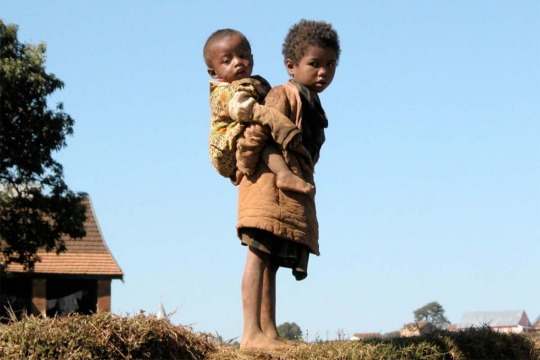
This is the ranking of the worst schools in the world. What's about the best schools in the world?
1.South Korea.
2.Japan.
3.Singapore.
4.Hong Kong.
5.Finland.
6.United Kingdom.
7.Canada.
8.Netherlands.
(South Korea)
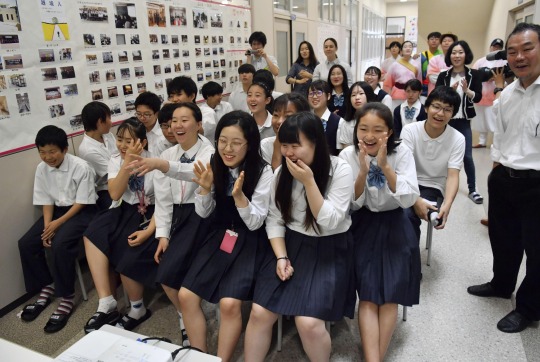
In the world there are 244 million young people and children, between 6 and 18 years old, who do not go to school. This was announced by Avvenire, which points out that, of these, 40% live in sub-Saharan Africa, of which 20.2 million only in Nigeria.
So now we know the baddest and best schools in the world, but what's the school system more stressful?
Stress, especially when prolonged over time, can lead to many health problems, from the simplest to the most serious, because it alters the immune system: skin diseases, dry mouth and memory lapses, and, in the most serious cases, even heart problems.
The WeWorld report highlights how the Italian school system is one of the most stressful in the world: more than half of students say they feel nervous while studying, compared to an OECD average of 37%.
Among the 3651 students surveyed, 9 out of 10 confirm that they experience anxiety and/or stress before taking written and oral tests.
I'm an Italian student. I can confirm it.
But why do I think that is really bad the organization?
Is outdated and overly theoretical curricula, inadequate technological equipment, poor teacher motivation, school buildings and overcrowded classrooms. These are the 5 main weaknesses of the Italian school system, beyond the Coronavirus emergency that has further complicated the situation.
How is the Italian school system organized?
State compulsory schools are free and divided as follows: Primary school (elementary) - from 6 to 11 years, compulsory; Lower secondary school (middle) - from 11 to 14 years, compulsory; Upper secondary school from 14 to 19 years, compulsory up to 16 years old.
How toxic is the Italian school?
The European Commission brings us back to our difficult reality: Italy is among the five worst in Europe (out of 28) for dropouts: 17.6% of pupils leave their desks too early against the EU average of 12.7%.(-23 Oct 2016.)
My Testimony:
Italian school is really though, not because we have more hour to do but because teachers never said thing that can motivate us. They kick our butt if we aren't what they want us to be. If aren't good in their subjects we are a bunch of losers.
They insult us saying that we are going to make anything in our life. They said that to children, kids and teenagers.
For the new generation they have reserved us a bullshit.
Teachers don't teach us to live. They teach us about somethings that we have to know but they don't tell us how to survive.
In Italian we have two different options for saying teacher. "Maestro" is the one that teaches you life lessons explaining traditional lessons, "Professore" is the teacher that teaches you traditional lessons without a lesson . And I met only two teachers that are "Maestri".
8 notes
·
View notes
Text
While much has been written on China’s media campaigns in the United States, Europe, and Asia, until recently Beijing’s Africa-focused propaganda has received comparably little attention. But it represents a model Beijing is building on to target the global south more broadly. Africa’s 1.48 billion people, set to hit 2.48 billion by 2050, are a critical part of the global community, and China is keen to win them over. Chinese Communist Party (CCP) propaganda emphasizes positive changes in African societies that are attributed, whenever possible, to cooperation with, or learning from, China.
Beijing seeks to build an international coalition of like-minded partners to help further its “core national interests.” While there are various interpretations of this term, all assume three basic overlapping objectives: ensure the CCP will continue to rule China; maintain and defend China’s sovereignty and territorial integrity, as defined by the CCP; and promote a stable international environment conducive to enhancing China’s comprehensive national strength. Beijing is working to develop compelling messaging and strengthen its capacity to reach African audiences, with so far mixed results.
On one hand, Africans generally view China’s presence on the continent favorably. China’s official news agency, Xinhua, has 37 bureaus in Africa, more than any other media agency; and China’s Africa-focused propaganda programs have successfully cultivated dozens of influential African interlocutors who help promote the country’s image and interests. Yet despite spending untold millions of dollars each year on its Africa-focused propaganda work, by some measures China’s favorability still lags behind that of the United States. Moreover, Beijing’s official media outlets have low levels of African viewership, and there is little overlap between the most common themes in their coverage and those in mainstream African media outlets.
Since the CCP’s founding in 1921, it has used propaganda to “educate the masses” and “mobilize friends to strike at enemies.” For non-Chinese—in this case Africans—China’s external propaganda work advances four mutually reinforcing messages: promote a positive view of the CCP and China; promote party policies and Chinese culture; counter hostile foreign forces; and assert and normalize China’s territorial claims over Taiwan, Hong Kong, Tibet, the South China Sea, and other contested areas.
While China has long focused on vanity projects such as stadiums and presidential palaces to court African countries, today Beijing also aims to create what Yang Jiechi, the director of China’s Central Foreign Affairs Commission Office, called “favorable public opinion for the friendship and cooperation between China and Africa.”
Since taking power in 2012, Chinese President Xi Jinping has spoken repeatedly about the need to increase China’s “soft power” by creating a compelling Chinese narrative and strengthening the party’s capacity to convey its political messages overseas. At the 2013 National Conference on Propaganda and Ideological Work, Xi emphasized the “use of innovative outreach methods to tell a good Chinese story and promote China’s views internationally.” In 2014, he introduced a new foreign media–management strategy intended to create “a new type of mainstream media” that would be “powerful, influential, and credible.” Chinese officials understood their marching orders, and worked to enhance the country’s capacity and breadth of propaganda.
Most recently, during his report to the CCP’s 20th National Congress in October 2022, Xi instructed the CCP Central Propaganda Department to “accelerate the development of Chinese discourse and narrative systems, effectively communicate the voice of China, and portray a credible, lovable, and respectable image of China.”
Although official figures are not available for China’s external propaganda expenditures, in 2017 David Shambaugh of George Washington University valued them at about $10 billion per year. Between 2017 and 2020, Freedom House’s Sarah Cook identified “a dramatic expansion in [China’s] efforts to shape media content and narratives around the world, affecting every region and multiple languages.” In 2020, she estimated that China spends “hundreds of millions of dollars a year” on external media propaganda. In 2022, Freedom House estimated Beijing was devoting “billions of dollars a year to its foreign propaganda and censorship efforts.” It’s unclear just what percentage of this is targeted at Africa—but China’s efforts there are extensive.
China’s party-controlled media outlets, sometimes referred to as the Big Four—Xinhua, China Daily, China Radio International (CRI), and the China Global Television Network (CGTN; CCTV International until 2017)—target African audiences in various countries, regions, and linguistic groups. All four receive an unknown amount of vast state resources that allow them to cover a wealth of stories using various types of media (i.e., print, television, radio, and online) in all six U.N. languages—Arabic, English, French, Spanish, Russian, and Chinese—four of which are official languages in at least one African country. They do not identify themselves as CCP-controlled outlets, and each has numerous multilingual, outward-facing social media accounts with millions of followers on platforms that are blocked in China, such as Twitter, Facebook, YouTube, and Instagram.
Within these outlets, the propaganda department’s cadres dominate the editorial process and ensure that stories glorifying CCP leaders receive top billing. Experts identify two types of Chinese staff working at CCP media outlets in African countries: officials from the propaganda department masquerading as journalists, and actual professional journalists. Although the former lack journalism training, they make editorial decisions and oversee both the African and Chinese journalists.
To give its broadcasts an authentic flavor, CGTN headhunts recognizable African TV hosts and reporters and offers them well-paid jobs. After joining a Chinese state-media outlet, however, they learn that investigative journalism is unwelcome if it casts either China or its partners in a negative light. Working in China’s official media means the African journalist must agree not to cover an ever-expanding group of topics deemed “sensitive” by the propaganda department. The editorial line looms over journalists, as one African reporter at China Daily put it: “Within the periphery of the editorial policy, you have every freedom …. Outside the editorial policy, it is impossible to do any story.” An African CGTN journalist concurred: “We know what is acceptable and what is not acceptable. These things will be made clear to you when you join as to what kind of reporting is expected of you and what direction you are expected to take.”
China uses local outlets and influential African voices to disseminate and authenticate its Africa-focused propaganda. Chinese interlocutors build relationships with prominent Africans across various fields, whom the CCP designates as “friends of China.” The objective is to match party-controlled media conglomerates with local content providers to disguise Chinese reports in ways that make them “appear native to the independent publication,” Cook observed in 2020. These “friends” regularly appear on air and provide quotations or write articles for China’s propaganda outlets. In return for pushing Beijing’s propaganda, they may receive material or financial support and, prior to COVID-19, all expenses–paid trips to China.
China also uses business transactions and content-sharing agreements to expand the reach of its Africa-focused propaganda. Some smaller African media houses use Xinhua’s international content, which they obtain via syndication agreements with larger African outlets or state broadcasters. For cash-strapped African outlets, Xinhua’s international reports and images can be an economic lifeline. For Beijing, these outlets’ tight budgets offer an opportunity to amplify and disguise its propaganda beneath a veneer of grassroots legitimacy.
This tactic, known in English as “astroturfing” and in Chinese as “borrowing foreign media” or “borrowing boats to reach the sea,” launders Beijing’s propaganda through either friendly or unwitting foreign media outlets. It has been observed across the global south, from Thailand and Laos in Asia to Peru and Panama in Latin America; and until recently such content had also appeared in some U.S. and European outlets. As of early 2023, news organizations in Egypt, Ghana, Kenya, Nigeria, South Africa, Zambia, and Zimbabwe are among those that have signed media cooperation and content-sharing agreements with Xinhua.
China’s firms have also used equity investments to enhance their influence over independent African publications. In 2013, for instance, China’s StarTimes acquired a majority stake in the South African satellite TV company TopTV. The firm’s partnership with TopStar, a Zambian state broadcaster, allowed it to obtain licenses for signal distribution and content provision. The China-Africa Development Fund and the state-owned China International Television Corporation own a 20 percent stake in South Africa’s Independent Online (IOL), which has become the official media partner of China’s embassy in South Africa. In 2018, IOL columnist Azad Essa was fired after he criticized China’s persecution of Muslims in his column.
Training African media is another powerful tool. In the 2018–21 Forum on China-Africa Cooperation Beijing Action Plan, China agreed “to hold training and capacity building seminars for African countries’ media officials and journalists, promote more exchanges and mutual visits between Chinese and African media personnel and support more exchange of correspondents by media houses.” The purpose of media exchanges and trainings is to foster more cooperation “in media operations, program production, technical services and personnel training.”
China also underwrites private bilateral and multilateral training sessions for African journalists and editors. These working-level seminars provide the optimal environment for building relationships. After being feted in China, many attendees naturally feel reluctant to produce content that impugns their generous hosts when they return home.
Before COVID-19, China’s rapid expansion of sponsored exchanges, syndication agreements, and media training programs for African journalists suggested it believed its outreach was working. By 2017, CRI had secured content sharing agreements with at least 70 overseas radio stations and 18 global internet providers. Indeed, dozens of African media professionals do republish or share China’s propaganda content. These cheerleaders legitimize the party’s rule over China, advance Beijing’s claims to lead the global south, deflect criticism of China and its African partners, perpetuate anti-United States narratives, and question the effectiveness of liberal democracy. As China’s African “friends” gain resources and influence, the predictable result is media in countries such as Kenya, Ghana, and Malawi are reprinting increasing amounts of Xinhua content—even as concerns about China’s intentions continue to mount in Western capitals.
Still, the reach of China’s propaganda in Africa should not be overstated. After analyzing China’s influence on media coverage in 30 African countries in the first half of 2020, scholar Dani Madrid-Morales concluded that Chinese sources appeared to be much less influential than French or British outlets, but more influential than U.S. media.
One reason may be their small audience size. In 2021, roughly 2 percent of Kenyans and South Africans listened to CRI or read China Daily, and about 7 percent of Kenyans and 6 percent of South Africans watched CGTN. (Not surprisingly, Madrid-Morales and Herman Wasserman found those who consumed Chinese media tended to hold more positive views of China.) This limited reach may help explain the decline in favorable opinions of China in these two countries between 2013 and 2019—from 78 percent to 58 percent in Kenya and from 48 percent to 46 percent in South Africa, according to the Pew Research Center—even before the pandemic impacted China’s global image. During the same time, the percentage of Nigerians holding favorable views of China fell from 76 percent to 70 percent.
As officials in a liberal democratic nation, U.S. policymakers cannot set a strict editorial line and enforce it by suppressing critical African voices. They have neither the bureaucratic apparatus nor the inclination to compete head-to-head with CCP propagandists. Instead, consistent with U.S. traditions and values, Washington should help support independent African journalism that holds governments and leaders accountable.
Yet, despite widespread recognition that long-term strategic competition with Beijing is unavoidable, the U.S. government has yet to overtly contest China’s anti-United States propaganda in Africa. The primary reason for this appears to be Washington’s long-standing bipartisan neglect of Africa. Instead of continuing with this laissez-faire approach, the United States should actively thwart CCP propaganda that wrongfully disparages it.
It can do so in various ways. For instance, Voice of America can adopt a well-resourced and coordinated “go where the people are” strategy that reflects emerging demographic trends and the ongoing transition to social media apps and streaming platforms. And U.S. entities such as the National Endowment for Democracy can work with local partners, such as independent fact-checking organization Africa Check, to identify false or misleading reports and shine a spotlight when Chinese officials or their African collaborators suppress critical reporting.
Additionally, to encourage African outlets to find alternatives to Chinese propaganda, U.S. news agencies such as the Associated Press and Bloomberg could cut the costs of their feeds for African media outlets, and the U.S. government can offer those agencies subsidies instead. Washington could also underwrite both short-term and degree-granting journalism training programs to help African media professionals develop the techniques and professional connections they need to resist China’s inducements and intimidation.
The same conditions that have precipitated China’s investments in the African media sector—the continent’s youthfulness and its growing population—should also be attractive to the United States. Despite decades of neglect and China’s best efforts, Africans in many countries continue to hold favorable views of the United States. By investing in objective, high-quality local reporting and juxtaposing this grassroots approach with China’s heavy-handed censorship, the United States can offer an alternative to China’s propaganda on the continent.
6 notes
·
View notes